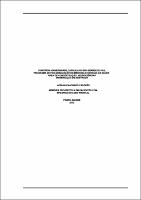| Share record |


|
Please use this identifier to cite or link to this item:
https://tede2.pucrs.br/tede2/handle/tede/1687| Document type: | Dissertação |
| Title: | Memória prospectiva em pacientes com epilepsia no lobo frontal |
| Author: | Vasques, Adriana Machado  |
| Advisor: | Costa, Jaderson Costa da |
| Abstract (native): | Introdução: Pacientes com Epilepsia do Lobo Frontal (ELF), embora geralmente demonstrem um bom desempenho nos testes tradicionais de memória, apresentam muitos esquecimentos na vida diária, comprometendo sua vida acadêmica, profissional e social. Tais esquecimentos referem-se à Memória Prospectiva (MP), que consiste em recordar, no momento adequado uma intenção a desempenhar no futuro. Objetivo: Este estudo buscou investigar a MP nos pacientes com epilepsia frontal, analisando a interferência da presença de lesão, da lateralidade e da localização do foco epileptogênico no desempenho da MP, assim como sua correlação com outros testes de memória e de funções executivas. Metodologia: Foi realizado um estudo de caso-controle para avaliação da MP, sendo constituído de 27 pacientes adultos com epilepsia de lobo frontal, confirmada por EEG (eletroencefalografia), VEEG (vídeo-eletroencefalografia) ou RM (ressonância magnética cerebral). Desse grupo, 16 apresentavam lesão em região frontal e 11 não apresentavam nenhuma lesão. Um grupo de 16 adultos sem epilepsia constituiu o grupo controle. Todos os sujeitos realizaram avaliação neuropsicológica, constituída de testes de dominância manual, teste estimado de QI (Coeficiente de Inteligência), testes de memória verbal, visual (imediata e tardia), teste de MP, atenção, fluência verbal e demais testes de função executiva. Também responderam a um Questionário de auto-avaliação da memória e uma escala para identificar comorbidades psiquiátricas. A MP foi avaliada através de um teste que simula tarefas da vida diária. Resultados: O grupo de casos (10,3±4,2) apresentou média significativamente menor que o grupo controle (15,7±2,1) no teste de MP. Ao comparar o grupo com lesão e sem lesão, estes não se mostraram significativamente diferentes quanto ao desempenho na MP. Em relação à lateralização do foco epileptogênico, o grupo com foco bilateral obteve pior desempenho na MP que o grupo à direita, embora não tenha diferido de forma significativa do grupo à esquerda. Conclusão: Os pacientes com epilepsia frontal tiveram pior desempenho da memória prospectiva do que o grupo controle; a presença ou não de lesão não interferiu no desempenho da MP; os pacientes com foco bilateral tiveram pior desempenho da MP. Em relação à lateralidade do foco (direita ou esquerda) não houve diferença na MP. O desempenho da MP correlacionou-se com a atenção e com a memória visual tardia. |
| Abstract (english): | Introduction: Patients with Frontal Lobe Epilepsy (FLE), although they generally show a good performance in traditional memory tests, they are very forgetful in daily life, which affects their academic, professional and social life. Such forgetfulness is related to Prospective Memory (PM), which consists in recalling, at the appropriate time, an intention to be performed in the future. Objective: This study investigated PM in patients with frontal epilepsy, analyzing the interference of the lesion, laterality and location of the epileptogenic focus in PM performance, as well as its correlation with other memory and executive function tests. Methodology: We conducted a case-control study to evaluate the PM, being comprised of 27 adult patients with frontal lobe epilepsy, confirmed by EEG (electroencephalography), VEEG (video electroencephalography), or MRI (cerebral magnetic resonance imaging). Out of this group, 16 showed lesion on the frontal region and 11 did not show any lesion. A group of 16 adults with no epilepsy formed the control group. All subjects underwent a neuropsychological evaluation, consisting of manual dominance tests, IQ (intelligence quotient) estimated test, verbal memory tests, (immediate and delayed) visual test, PM test, attention, verbal fluency and other executive function tests. They also answered a questionnaire for memory selfevaluation and a scale to identify psychiatric comorbidities. PM was assessed by a test that simulates daily life tasks. Results: The case group (10.3±4.2) showed a significantly lower mean than the control group (15.7±2.1) in the PM test. When comparing the group with lesion to the group with no lesion, they were not significantly different in PM performance. Regarding the lateralization of the epileptogenic focus, the group with bilateral focus had a worse performance in the PM than the group with the focus on the right, though it did not differ significantly from the group with the focus on the left. Conclusion: Patients with frontal lobe epilepsy had a worse prospective memory performance than the control group. The presence or absence of injury did not affect PM performance. Patients with bilateral focus had the worst PM performance. Regarding focus laterality (right or left), there was no difference in PM. PM performance was connected to attention and delayed visual memory. |
| Keywords: | MEDICINA NEUROCIÊNCIA MEMÓRIA EPILEPSIA LATERALIDADE |
| CNPQ Knowledge Areas: | CNPQ::CIENCIAS DA SAUDE::MEDICINA |
| Language: | por |
| Country: | BR |
| Publisher: | Pontifícia Universidade Católica do Rio Grande do Sul |
| Institution Acronym: | PUCRS |
| Department: | Faculdade de Medicina |
| Program: | Programa de Pós-Graduação em Medicina e Ciências da Saúde |
| Citation: | VASQUES, Adriana Machado. Memória prospectiva em pacientes com epilepsia no lobo frontal. 2012. 128 f. Dissertação (Mestrado em Medicina e Ciências da Saúde) - Pontifícia Universidade Católica do Rio Grande do Sul, Porto Alegre, 2012. |
| Access type: | Acesso Aberto |
| URI: | http://tede2.pucrs.br/tede2/handle/tede/1687 |
| Issue Date: | 28-Mar-2012 |
| Appears in Collections: | Programa de Pós-Graduação em Medicina e Ciências da Saúde |
Files in This Item:
| File | Description | Size | Format | |
|---|---|---|---|---|
| 438285.pdf | Texto Completo | 5.25 MB | Adobe PDF |  Download/Open Preview |
Items in DSpace are protected by copyright, with all rights reserved, unless otherwise indicated.




